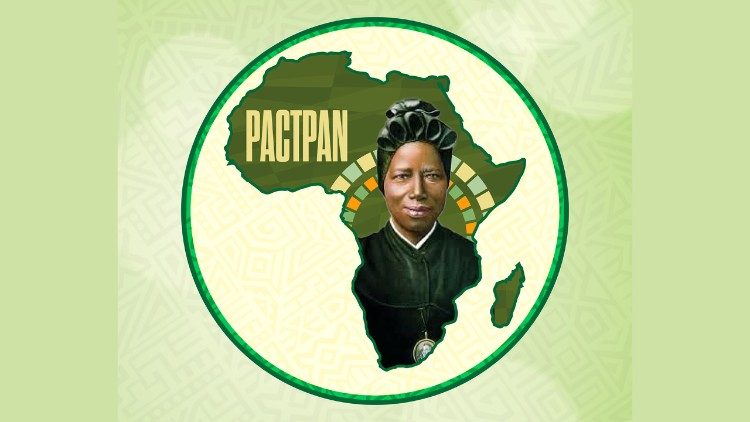
NGOCSTIP – On Saturday, 8 February 2025, over 20,000 participants joined a webinar organized by the PACTPAN (Pan-African Network for Catholic Theology and Pastoral). The network launched its campaign against human trafficking, bringing together attendees from over 31 countries. The goal was to address and propose actions to combat modern slavery and human trafficking by 2030.
This year’s event coincided with the eleventh annual celebration of Saint Josephine Bahkita Day. The Vatican established this day in 2015, and it serves as Anti-Human Trafficking Day. It marks the conclusion of a week of activities focused on raising awareness and praying for victims. Saint Josephine Bahkita was a Sudanese girl enslaved at a young age. Later, she became a Canossian religious sister in Italy. Her story of resilience has inspired countless individuals fighting against human trafficking.
This year, PACTPAN launched its campaign with a focus on ending human trafficking and modern slavery. The event attracted participants from Africa, Europe, and America. Uganda’s Vice President, Jessica Alupo, delivered the keynote address, sharing insights on the global crisis of human trafficking.
“Read about: IOM and Partners Seek USD 81 Million to Support Migrants in Africa and Yemen”
In her keynote speech, Vice President Jessica Alupo stressed that human trafficking is a global issue. It transcends borders, cultures, and economies. She highlighted the troubling rise in labor export and its connection to the illegal trafficking of humans. “Desperate young men and women try to escape poverty, wars, and disease. They fall into the hands of traffickers,” she said. “This creates an uncanny normalcy, yet it remains an ever-growing stain on our collective humanity.”
Alupo’s speech painted a grim picture of modern slavery, with an estimated 40 million individuals trapped in various forms of exploitation. She also pointed out that technological advancements and social media provide traffickers with new tools for recruitment and exploitation.
The Vice President emphasized that human trafficking affects not only its victims but society as a whole. Therefore, she called for urgent action from all sectors—religious leaders, legal experts, NGOs, and the private sector. Alupo stated, “We must unite against this violation of fundamental human rights.” In addition, she reminded the audience that the issue was not just a legal or operational challenge but a moral imperative.
Alupo’s message was clear: the fight against human trafficking is a collective responsibility. “It is about human dignity, justice, and freedom for all. Furthermore, the Jubilee Year invites us to be ambassadors of hope,” she added.
“Read more: John Hawkins’ Insane Daily Routine: Productivity Secrets Exposed!”
The event also featured Professor Fr. Stan Chu Ilo, one of the PACTPAN coordinators. He encouraged participants to take the lessons learned from the webinar and implement them in their national chapters. “We need strong, effective, courageous, and strategic national PACTPAN chapters,” he said. Fr. Ilo stressed the importance of collaborating with various religious and civic leaders to create a unified front against human trafficking.
During the webinar, Peter Benjamin, a survivor of human trafficking, shared his harrowing experience. He described his journey from Benin, Edo State, to Libya, where traffickers brutally beat him and other victims. He spoke about his failed escape attempt, which resulted in him being stabbed by his captors.
Deborah, a Kenyan national and fellow survivor, also shared her story. She was trafficked to Saudi Arabia between 2020 and 2022. What she thought would be a job in domestic work turned into an enslavement ordeal. She revealed that four of her colleagues died during her time in captivity. Consequently, her experience highlights the grave dangers faced by those trapped in such situations. Now, Deborah dedicates her life to rescuing others trapped in similar conditions.
At the start of the webinar, Sister Leonida Katunge, Coordinator of PACTPAN’s anti-human trafficking project in Africa, made a powerful statement: “Today, we all say: Enough! Africa must rise and act.” She emphasized that the mission of PACTPAN is to end modern slavery. The network plans to do this by raising awareness, educating communities, and empowering people to recognize the signs of trafficking.
Sister Katunge also advocated for stricter policies and enforcement measures against traffickers. As a result, she emphasized the need for stronger action to combat human trafficking effectively. She called for a concerted effort to protect vulnerable individuals and prevent them from being exploited.
PACTPAN aims to support trafficking survivors through rehabilitation and reintegration programs. The network intends to provide survivors with pastoral care, psychological support, and economic empowerment. Additionally, PACTPAN plans to partner with religious and civic leaders to build a world that protects the most vulnerable instead of exploiting them. In this way, they aim to foster a more compassionate and just society.
Sister Katunge concluded by linking the theme of the Jubilee Year with the webinar’s message. “The Jubilee Year calls us to renew our commitment to justice and work tirelessly to eradicate modern slavery.” She drew inspiration from Saint Josephine Bahkita, who, despite enduring the horrors of slavery, ultimately found hope and freedom through her faith. In the same way, her story serves as a beacon of light for those suffering from human trafficking today. “Silence in the face of such injustice is not an option,” Sister Katunge said. “We must raise our voices, advocate for vulnerable individuals, and dismantle the structures that enable human trafficking.” By working together in solidarity, she added, Africa and the world can end human trafficking.
PACTPAN’s campaign aims to raise global awareness of human trafficking and modern slavery. The network hopes to bring about lasting change through education, advocacy, and collaborative efforts with key stakeholders. Sister Katunge reminded participants that they are not just fighting for the victims—they are fighting for justice, freedom, and the dignity of all people.